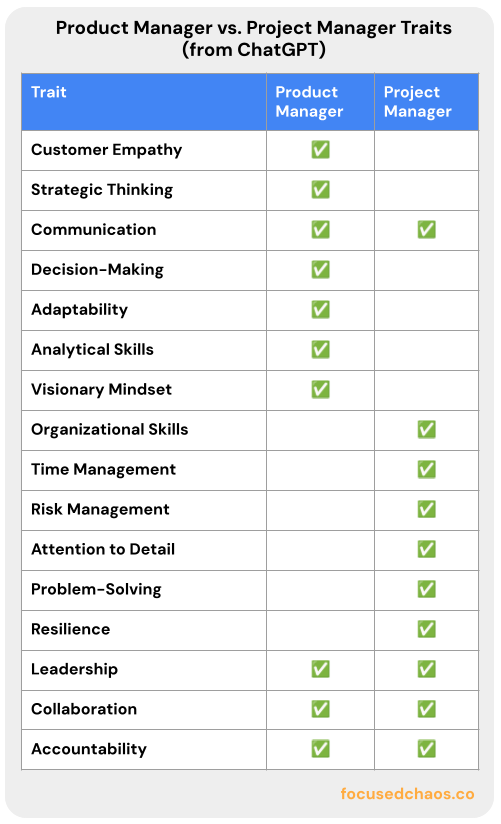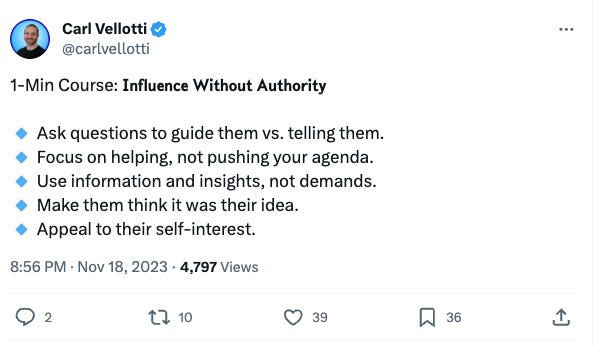The Difference Between Product Management and Project Management
Product Management is NOT Project Management (at least not exclusively!) (#84)
Every startup needs product management and project management. The work has to be done by someone. That doesn’t mean the work has to be done by a product manager or project manager.
Many people believe product management is project management. In turn they dismiss the importance of the work and the need for someone to do it. In early stage startups, with just a handful of people, you definitely don’t need much project management, but someone has to keep things organized. It’s amazing how quickly things derail even in small teams when no one is keeping people moving in the same direction. It’s so easy to assume everyone knows what they should be doing and they’re aligned—they’re not. 😂
The term “product management” is part of the problem. I’ve written about this before:
The word “management” implies more of a focus on organization, scheduling, etc. (i.e. typical project management tasks) as opposed to the craft of building a product that creates value.
I asked ChatGPT to differentiate between product and project management. It did a pretty good job. 😀
Everything in that table is important. Everything needs to get done (to varying degrees, depending on the startup stage, product/project scope).
When a startup hires their first product manager (often to replace the CEO who is too busy doing other things), one of a few things happens:
The CEO remains in charge, but now delegates through the product manager. The product manager is effectively the CEO’s mouthpiece, and it’s really a project management role. Eventually the CEO gets fed up that the product manager isn’t doing their job (because it was ill-defined or differently defined upfront) and fires the product person, because “they weren’t really doing anything except relaying my instructions, and things were slowing down.” 😢
The CEO gives the product manager autonomy to drive the product (i.e. do the work in the first column above) but the team is unclear on who has real authority. Is it the CEO or the new product person? “Who is this new product person coming in? We always listened to the CEO before…” Things slow down, people go around the product manager to the CEO, and eventually the product person is fired because things aren’t happening quickly enough and the CEO wants to streamline. 😤
The CEO gives the product manager autonomy to drive the product, but starts disagreeing with the direction (even if the market / customer needs point that way). The CEO has their own product priorities and they can’t understand why those aren’t being dealt with. Eventually, the CEO fires the product person or puts them into a contained “project management” box. 🤪
The CEO gives the product manager autonomy to drive the product, and they collaborate closely to stay aligned, maintaining the “chain of command” with the rest of the team. The CEO doesn’t micro-manage, but expects things are shipped on time and properly (i.e. project management) that actually drive value and move the company towards its mission/vision (i.e. product management). 😊
This isn’t all the CEO’s fault. Product managers are to blame as well.
Product Managers ❤️ Process and it’s Their Downfall
Product managers, in an attempt to solidify their position within companies, implement arduous processes to get everything done. They believe their expertise in doing things the “right way” will ensure their value. Suddenly you can’t change a line of copy without doing a full-blown user study, writing five user stories and documenting everything in four places. The process rules over all. 😱
Product managers—who should be craftspeople and architects—become process gurus that lack opinion and instinct. Nothing gets done without a healthy dose of opinion and instinct. Remove that and product managers are project managers, and things fall apart.
If product managers try to make everything an X-step process, with no flexibility, get rid of them. Process is needed, without question, but the key is having the right creative mindset of how to build products infused into a flexible(ish) methodology. Nothing is writ in stone. The “best product management how-tos” were made to be broken every once in awhile. This is why I think of product management as a craft; there’s a bit of art mixed in (art can be extremely precise, but you get the point.)
As a reaction to “product managers are just project managing, but not really building,” companies are eliminating product managers and reassigning the work. The challenge is if no one owns something, everyone does.
Who is in charge of making decisions?
Who is in charge of tracking progress, putting their hand up when things are going sideways, and keeping things running smoothly?
Founders / CEOs need to be careful that they don’t empower everyone to run product. You can’t build a great product by committee. Someone has to ultimately make decisions and rally the team. The CEO can play that role, but eventually they have to hand over some of that responsibility to others (despite the positive shift towards founder mode.)
Product Managers are Builders
Product managers don’t necessarily design interfaces or write code (although many can!), but they do build. The actual building of a product is important (designs and code are needed), but there’s so much more to it.
User empathy
Defining scope
Defining how something should work
Testing and refining before coding/building (once something is built, it’s harder to change)
Defining success criteria
Etc.
All of this is building.
Connecting product work to the business model is building; i.e. deciding what gets built and how its impact is measured against the core business model. This is absolutely critical, and without it, you’re likely to fail.
Product Managers are Project Managers but NOT Exclusively
Take away the titles (product manager & project manager) for a moment. The product has to get built and the work to get you there (i.e. the projects) have to be managed. It’s about the skills needed and the work that has to get done, not the roles and titles.
I asked ChatGPT to tell me what traits product and project managers need to be successful. Here’s the output:
How does a product get built successfully without all of these traits being covered? (Hint: it doesn’t!)
A product manager should have all of these traits. That’s what makes product management (or really, “building great products”) so hard, because it requires a lot of different traits and skillsets. Some of these traits, like visionary mindset and attention to detail, are in opposition of one another. Great product managers have a 20,000 and 2 foot view at the same time.
Trying to find all of these traits in one person is extremely tough. Even if you do, you still need to empower that person the right way so they can do their job.
Project management is a component of product management. You can’t build great products without some level of project management. But if that’s all a product manager is doing, they won’t deliver enough value.
Successful Product Managers Step Up
In many companies, product managers run a variety of meetings. Maybe you have a Monday status meeting on what was accomplished last week and what has to get done next. Cool. Do that. But for a product manager to be successful, they need to run that meeting with a lot of authority and not let everyone else pull them in a bunch of directions. The person in charge of delivering a great product (see how I didn’t use the term “product manager”) has to take ownership and responsibility. If all you do is run a few meetings and track things on a Kanban board, people will run over you. You’ll be pigeonholed into the “status update person” (i.e. a project manager).
There’s a classic line that product management is influence without authority.
I vehemently disagree. Someone has to be in charge. Why shouldn’t it be the product manager? It doesn’t have to be a product manager, but someone is responsible for shipping product and ensuring that the product is creating actual value for users/customers. It could be the CEO, but then don’t hire a “product manager” if you’re not going to give them authority.
The person responsible for delivering product could have a different title (they don’t have to be called a “product manager”), but don’t diminish the importance of all the product-related work that has to get done. It’s enormous. Even simple, small products are incredibly complicated to build properly. Mark Twain knew it…

If you give product-focused work to others (i.e. not a dedicated person), make sure they can handle that work and whatever other responsibilities they have. You might realize you’ve given someone 3 jobs to complete (their own + product + project management). I’m all for context-shifting and A-players that drive outsized value, but there’s a limit.
Great products are built by great craftspeople that have a process, but are willing to adapt.
They’re creative, visionary and strategic but able to dive into the weeds to make sure every task is completed.
They’re analytical but not to the point of ignoring their gut.
They make decisions quickly and rally everyone, but also think constantly about everything they’re doing and take their time when necessary.
Building products is easy. Building great products that solve real pain points and create value for users/customers is very hard.
If you want to simply build a product, don’t invest in product management. If you want to build the right product, you need the skillsets and traits of a great product manager, embedded somewhere on the team, and that person needs the time, energy and commitment to do the product-related work.









Great article – as a Product Manager in an AI startup, I can really relate to it.
Early on, I struggled with the blurred lines between product and project management, especially since so much landed on my plate – from recruitment and setting up the office to accounting, project management, and overseeing two products. I was a one-woman army, and as you mentioned, there are limits to what one person can handle!
Another challenge was working with the CEO, who initially tried to impose processes from non-tech industries. Taking full responsibility for the processes in our startup has shown me how essential autonomy and mutual trust are. Without them, it’s nearly impossible to build something sustainable.
Now that things have stabilized, I’m finally experiencing a better balance between product and project management tasks. I can focus on refining the product and leading the team in the right strategic direction. It’s such a relief but also a reminder of how important it is to set boundaries – because while we can do a lot, we can’t do everything at once!
That balance, of “great craftspeople that have a process, but are willing to adapt.” Is quite rare in me experience :)
I’ve worked with 8 Product Managers so far in my career, and only 1 was both. Most common are very process oriented, but some are too creative and not in the weeds.
As an engineering managers, I’m willing to take some of the ‘project management’ burden, but I always struggle to draw the line at the right place.